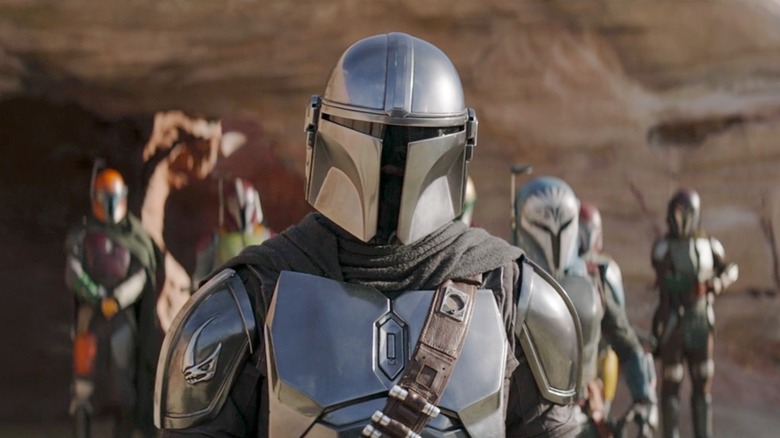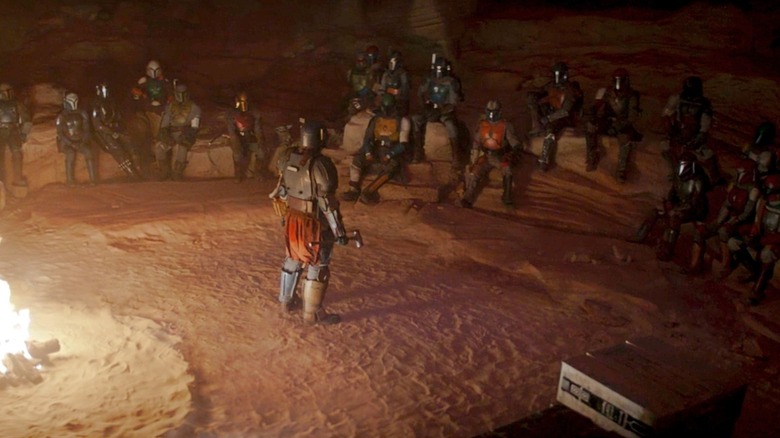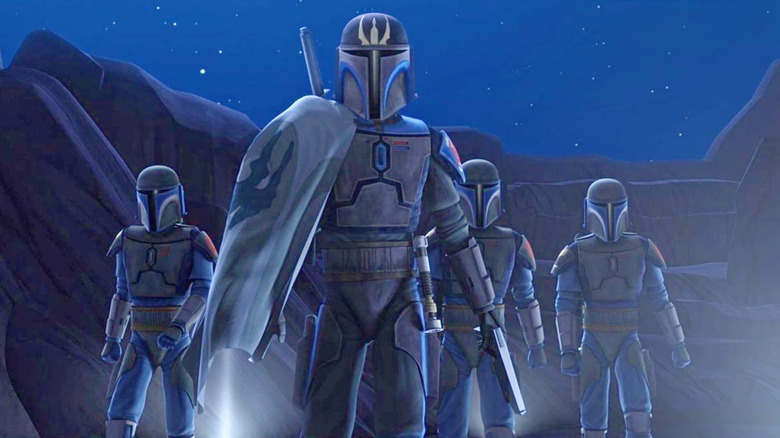The Mandalorian Season 3 Really Wants Us To Like The Extremist Group, Doesn't It?
This article contains spoilers for season 3, episode 5 of "The Mandalorian."
The question of what, exactly, "The Mandalorian" is about has eluded the first live-action "Star Wars" show. It is not about bringing Grogu "home," since the series already did that in season 2. It is not about discovering the fate of Mandalore, because that happened early on in season 3. So, the only logical conclusion is that the show is about Mandalorian culture as a whole, and the slow process of reclaiming the Mandalorians' lost homeland and its massive treasure of precious metal beskar. In a way, that makes it the "Star Wars" equivalent of J.R.R. Tolkien's "The Hobbit," which would make Grogu the show's Bilbo Baggins — in a matter of speaking.
It makes sense, then, that the show has shifted focus from Din Djarin to Bo-Katan, the most capable Mandalorian, the one who actually knows Mandalorian culture, had seen the planet Mandalore before its destruction, and has a personal stake in its retaking, as well as experience in leadership. We have seen her struggle in the fight to reclaim Mandalore — and get so sad about losing her squad that she didn't leave her chair for nearly two whole episodes — and we just saw her get tasked with uniting the different Mandalorian clans for whatever this show's answer will be to the Battle of the Five Armies.
There is just one problem: The main Mandalorian clan we know in the show, the one we are seemingly meant to follow and support, is a violent extremist cult of religious zealots that caused a civil war on Mandalore and even supported Darth Maul. And how do characters on "The Mandalorian" react to this information? With the shrug emoji, basically.
Wasted possibilities
In season 2, when we met live-action Bo-Katan, she explained that the group of Mandalorians we had been following on the show up to that point (the ones who had saved Din Djarin as a kid and given him shelter) were not like the rest of the Mandalorians, but actually an extremist cult called the Children of the Watch. They are obsessed with restoring the Way, an ancient faith of the first Mandalorians that they deemed had been lost by the rest of their kin.
This explains why this particular group of Mandalorians never remove their helmets when everyone on Mandalore was fine with it during the Clone Wars. Indeed, they are extremely weird about the whole helmet rule (which the more we find out about, the less it makes sense), and why they kicked Din Djarin out for removing his helmet despite it being in front of his adopted son, who is now an official Mandalorian foundling!
This prompted many (including me) to assume that the show was going to go on a deprogramming arc for good old Din, who was going to realize that his adoptive family was full of cultists and he had to learn what it truly meant to be a Mandalorian, without the whole indoctrinating children thing. Except, the series appears to be headed in a different direction.
Instead, season 3 has seemingly forgotten all about the Children of the Watch being zealots. Instead, they've become major characters we are supposed to care about and who have welcomed Din into their ranks full-time now that he bathed in some special water. Paz Vizsla, who once tried to kill Din, is now his biggest fan, and we are apparently meant to simply forget he's descended from an infamous Mandalorian terrorist from the Clone Wars.
Forgotten threats
For the uninitiated, the Death Watch was a terrorist splinter group of Mandalorians during the Clones Wars that was fixated on restoring what they believed to be the true way of Mandalore — one they felt the planet's pacifist government led by Bo-Katan's late sister, Satine Kryze, had strayed away from. They even attempted to take over the planet several times and eventually resorted to allying with Darth Maul to seize control. Paz Vizla's ancestor, Pre Vizsla, was the leader of this terrorist group, and Bo-Katan herself was a member at one point.
Considering Death Watch was a huge part of the animated "Clone Wars" TV series, it's kind of baffling to see "The Mandalorian" tease some kind of reckoning for the organization, only to apparently swerve in the opposite direction. What's more, season 3, episode 5 ends with The Armorer charing Bo-Katan with uniting all Mandalorian tribes, yet there's no mention of whether they are going to make a truce or if the intention is to indoctrinate them all into the Children of the Watch.
The fact that we don't know, coupled with the show's apparent lack of interest in exploring what the Children of the Watch even stand for anymore, is a huge wasted opportunity at best, a betrayal of "Clone Wars" at worst.
New episodes of "The Mandalorian" premiere Wednesdays on Disney+.


